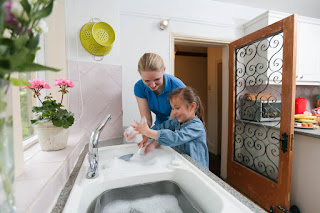Establishing
and maintaining a routine can be tricky for families struggling with young children in a
confined space without the usual schedule centred around nursery and school. Julia Gaskell,
Head of Consultancy and Training and a Norlander has compiled her top tips to
help families create a new routine or adjust an existing one as restrictions evolve.
"Establishing
a routine during these challenging and uncertain times can be beneficial to our
health and wellbeing. Our brains don’t always cope well with uncertainty and we
can often interpret change as a potential threat. We thrive on predictability
because then our brains don’t have to work as hard to keep us feeling safe and
secure.
This is
especially true for children because a routine can help them to feel safer,
especially during times of change, and will help them to orientate themselves
throughout the day. Being able to predict events can be comforting and helps us
to be more ‘in the moment’ as we are not worrying about what might be happening
next.
Routines
for babies and young children has been much written about and there are many
theories out there about the best ways to approach instigating one. This
article is going to consider young children, whose normal routine of going to school or nursery has already been disrupted and now may be facing further change as restrictions evolve.
Here are my
top tips:
1. Think
about the important stuff first.
What time does your child generally wake up? How much sleep do they need? What
are their mealtimes and bedtimes? Consider the healthy habits you wish to
encourage such as brushing teeth and washing hands. This will form the template
for your routine. It is easier to establish a routine that follows your child’s
natural rhythm.
2. Now
make a list of other things you want to fit into your and your child’s day. If your child is old enough,
include them in your planning so that they have a voice within the process.
3. Do not
worry too much about timings as these can be flexible. The order that you do things in is
more important than how long they last as it is this bit which helps your child
to predict what is happening next and helps them to feel more secure.
4. It
might be too difficult or unsettling to do everything all at once so you might want to introduce the
routine gradually.
5. Give
your child time to move from one part of the routine to another via a five-minute warning or
playing music in order to indicate a transition. This gives your child time to
adjust and prepare for the change.
6. You
could use symbols, objects or pictures to represent activities on a timeline so that your child can see where
they are within the routine and what is coming next, especially whilst it is
new. You could create these objects or pictures together.
7. Think about how you deal with
change yourself. It
can affect our behaviour and children are no different. It can be scary and
challenging, but a routine can help us all with this. You are always a role
model for your child; how you cope will give them a narrative for their own
approach.
8. Remember
to try to make the routine fun.
It’s meant to be a positive thing, not a list of chores to be completed.
9. Don’t worry
about adapting or changing the routine if needed. Make changes in a structured way
by preparing your child for the change and involving them in the process either
by talking through what will be changing or asking for suggestions of what you
can do differently. Try giving them a choice between two options so that they
feel involved and can express their growing autonomy.
“Start where you are
Use what you have
Do what you can”
Arthur Aste"
You may
also find our articles on supporting and guiding children during stressful times and
activity ideas useful.




No comments:
Post a Comment